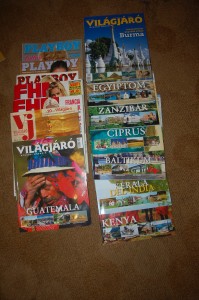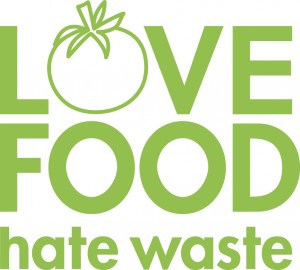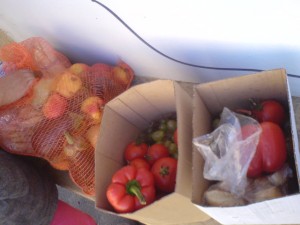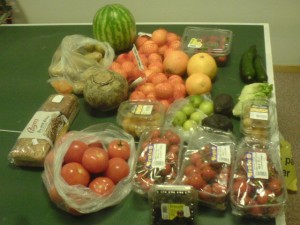Today by pure chance I found some magazines on the top of the huge blue container for papers at the bottom of Gazdagret.
Category Archives: Trash
A talk about food waste
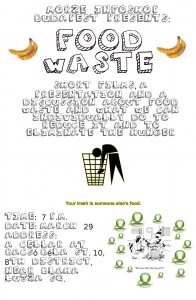 We’ll be showing short documentaries, presentation and a discussion about global food waste and hunger, as well as what can be done with it on personal level (dumpster diving). We will also discuss further actions on the scale of Budapest.
We’ll be showing short documentaries, presentation and a discussion about global food waste and hunger, as well as what can be done with it on personal level (dumpster diving). We will also discuss further actions on the scale of Budapest.
The event will take place at 7 p.m. on March 29 at Klub Bela (Budapest, Bacsó Béla St. 10).
Reclaim the Fields 2012, Turin
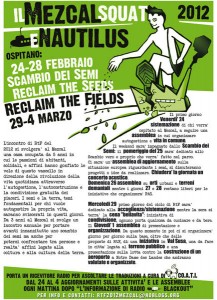 There will be a meeting of Reclaim the Fields in Turin from February 24 until March 4, 2012.
There will be a meeting of Reclaim the Fields in Turin from February 24 until March 4, 2012.
Here is the PRESENTATION OF THE GATHERING.
Food and Contemporary Human Beings
 Humans have become completely disconnected from the food that they eat. People don’t cook anymore because it takes too much time. We eat less and less basic food that comes from raw ingredients, and more processed, packaged food that comes from artificial supermarket environments. Hardly anyone grows their own food anymore, or raises their own livestock. Eating is no longer about connecting with our natural world – it is about shovelling fuel into our bodies in as little time as possible. And most people these days work in jobs that are completely removed from food production altogether.
Humans have become completely disconnected from the food that they eat. People don’t cook anymore because it takes too much time. We eat less and less basic food that comes from raw ingredients, and more processed, packaged food that comes from artificial supermarket environments. Hardly anyone grows their own food anymore, or raises their own livestock. Eating is no longer about connecting with our natural world – it is about shovelling fuel into our bodies in as little time as possible. And most people these days work in jobs that are completely removed from food production altogether.
To read more GO HERE.
Norway
Norway… Dumpstering? No Way!!! 🙂
Yes, it is possible. The truth is that almost nobody does this here. Maybe in Oslo people do it, I have no clue about it. But most of the country lives on social benefits, immigrants dive into trash for the bottles (1 bottle is ca. 20 Eurocent). ‘Poor’ means here that a single mother with three kids cannot buy them branded clothes or the bicycles of the latest model. And still they get social help that should be enough for several dozens families in, say, Zimbabwe.
Supermarkets here also close their trash. The city trash is quite often under a lock. But, of course, ther eare supermarkets that do not bother closing their trash bins. Who would even think of dumpster diving here anyway? Well, me!
The Canary Islands
Once I met some hippies who live in the Canary Islands. They told me that is is a great place to live as it is always warm (+18 in January in the daytime), so it is possible to live outside. It is quite good for making money by playing in hte street or selling some hand-made stuff as there are a lot of rich tourists there. At last, the islands are quite good for dumpster diving too.
Of course, it is good to hear 1000 times, but it is still better to see it and experience once. So, Dear Santa gave me a present – a week in Lanzarote, the Northern island of the Canary Islands.
The island was quite touristic, the sea coast was full with hotels and restaurants. I also saw some alternatively looking people playing music and pretending to be statues, as well as selling some ceramic and leather stuff. The temperature turned out to be high enough to live outside, even in January. One guy who was playing hte guitar in the street said he lived in a cave and it was wquite comfortable as there is almost no rain in the island.
Regarding the vegetation, the island looked quite rocky and desert like. It turned out that Lanzarote is of volcanic origin as any other ones in the chain, but the truth is that on this particular islands not many things grow. I saw mostly palm trees, cactus and some grapes. The locals say most of the food is imported from the mainland, primarily Spain, and other Canary Islands. So, the hope of getting local food from the island died.
Nevertheless, the curiosity took its power over me, and I tried to dumpster dive. There were several interesting encounters. First of all, during the New Year’s night a number of cafes put out some small packages outside of hteir doors. In one of the packages I found several pretty nice lemons. Then, there were some big trash bins, but the trash there was mainly from the restaurants and the houses, so, nothing really valuable.
Near the hotels I saw just a couple of interesting things that I did not really need: a pink child bag full of children clothes, and an insulating swimming suit.
The best part was, of course, the trash of one of the supermarkets. Most of them had their trash locked up, but I have found by chance one that had it open and accessible to the public. It just put out everything that seemed to be not OK just outside in the trash bin. Or in front of its door in case with the bread. You can see the results of dumpster diving in the supermarket trash.
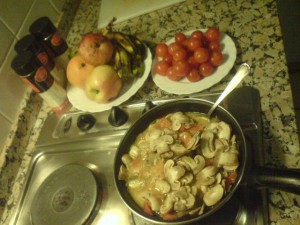 Some vegetables, fruit, mushrooms and sauce (the expiration date is several months from the date when it was found in the trash). Dinner is ready!
Some vegetables, fruit, mushrooms and sauce (the expiration date is several months from the date when it was found in the trash). Dinner is ready!
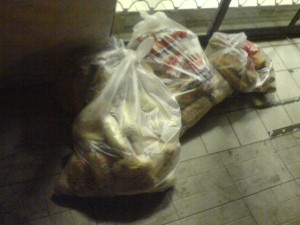 The bread outside of the supermarket. Fresh and packed.
The bread outside of the supermarket. Fresh and packed.
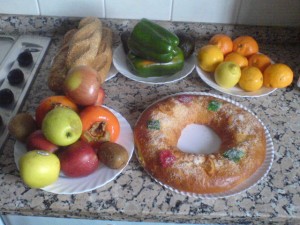 Some fruit, bread and the King cake – a traditional pastry for the Spanish Epiphany festival during the Christmas season (8 January in 2012)
Some fruit, bread and the King cake – a traditional pastry for the Spanish Epiphany festival during the Christmas season (8 January in 2012)
‘I Love Trash’ Documentary Covers The Art Of Dumpster Diving

The new film ‘I Love Trash’ is a documentary that follows two friends as they live for three months by getting everything they need out of the trash. They arrive at an unfurnished apartment with the clothes on their back and a flashlight, and we slowly see them decorate their apartment and make clothes from things they’ve found in dumpsters. The film is a compelling journey of two friends as they make a life out of what others throw away, calling into question our society of consumption.
I Love Trash | Watch the Documentary Film Free Online | SnagFilms
